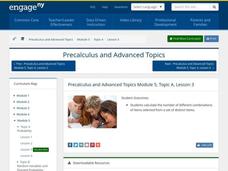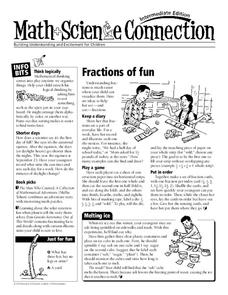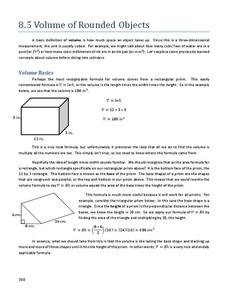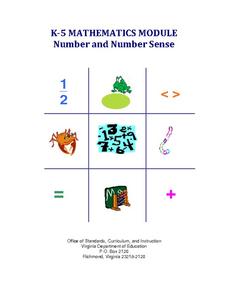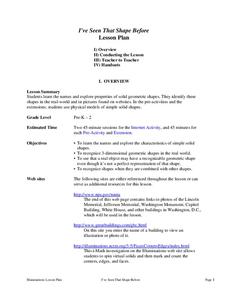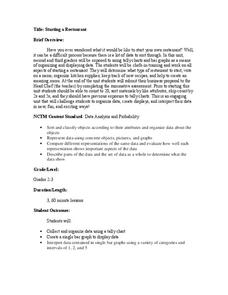Granite School District
Kindergarten CCSS Math Vocabulary Word List
Help kindergartners develop the academic language they need to master the Common Core standards with this list of math vocabulary. Including the definitions of each term as well as a set of word cards with supporting images and examples,...
Kinder Corner
Counting Cards
Reinforce counting skills with a set of cards that showcase numbers 1–10. Two types of cards are provided—a number card and a card that represents the number with objects.
US Department of Commerce
Let's Count!
Counting objects is easy as one, two, three. Young mathematicians count objects in the classroom and create data tables to record their results. They then write comparison statements and answer questions about the data.
EngageNY
Counting Rules—Combinations
Discover how combinations are different from permutations. In the third installment of a 21-part module, scholars learn how to determine combinations of objects. They learn to distinguish between situations where order is important and...
Curriculum Corner
“I Can” Common Core! 1st Grade Math
Any first grader can master the Common Core math standards with this checklist! With each standard rewritten as an affirmative I can statement, children are provide with clear goals to work toward throughout the school...
Resources for Educators
Fractions of Fun
Reinforce concepts and encourage learner engagement with a collection of math games, science experiments, and cross curricular activities. In one fun resource, learners sort objects, keep a diary of everyday fractions, play a game using...
Curated OER
Data Analysis, Probability, and Discrete Math
Choose to supplement your probability unit with this resource and you won't be disappointed with the outcome. Teach young mathematicians to organize information using tree diagrams and lists in order to determine the possible outcomes of...
Charleston School District
Volume of Rounded Objects
How much can different shapes hold? The answer varies depending on the shape and dimensions. Individuals learn the formulas for the volume of a sphere, cone, and cylinder. They apply the formulas to find the volume of these...
Curriculum Corner
Number Cards 1–20
Reinforce number identification with a set of colorful cards showcasing numbers 1 through 20.
Curriculum Corner
Number Cards
Showcase numbers one through twenty with a set of cards that displays each numeral in a bold, easy-to-read font.
Curated OER
K-5 Mathematics Module: Number and Number Sense
Reinforce number sense with a collection of math lessons for kindergarteners through fifth graders. Young mathematicians take part in hands-on activities, learning games, and complete skills-based worksheets to enhance proficiency...
National Security Agency
Awesome Area - Geometry and Measurement
Break out those math manipulatives, it's time to teach about area! Capturing the engagement of young mathematicians, this three-lesson series supports children with learning how to measure the area of squares, rectangles, and other...
Carroll Country Public Schools
Ten Frame Practice
Ten-frames are great visual tools that support the development of number sense in young mathematicians. A multitude of ten-frames are included in this slide show that provide learners with practice with quickly and fluently identifying...
August House
The Magic Pot
The Magic Pot by Patricia Coombs is the theme of this multidisciplinary lesson plan. Early readers first take part in a read aloud and grand conversation about the story's details. Then, they get to work practicing their skills in...
Illustrative Mathematics
Christo’s Building
Hook your charges on how to solve a real-world art problem with mathematics by showing works of Christo. You can find eye-catching images on the Christo and Jeanne Claude webpage. Here, math learners help Jean Claude and Christo prepare...
Doing Maths
Metric Measurements – Length
Seven word problems make up this metric worksheet where scholars convert measurements and find the length of objects in real-world scenarios.
National Security Agency
Backyard Building - Area and Perimeter
Turn young mathematicians into landscape architects with this four-lesson series on area and perimeter. Beginning with a basic introduction to calculating perimeter and area using non-standard units of measurement, this...
EngageNY
Using Permutations and Combinations to Compute Probabilities
Now that we know about permutations and combinations, we can finally solve probability problems. The fourth installment of a 21-part module has future mathematicians analyzing word problems to determine whether permutations or...
Fayetteville Public Schools
I've Seen That Shape Before
The objectives in the resource allow students to explore the characteristics of simple solid shapes. Youngsters learn to recognize the face shapes, corners, and edges that make up 3-D figures by filling in a chart. Lastly,...
National Security Agency
Starting a Restaurant
Through an engaging unit, chefs-in-training will sort and classify data using tally charts. Learners will also create bar graphs to display restaurant data and interpret data from bar graphs using a variety of categories....
West Contra Costa Unified School District
Mixture Problems
Mix up your lessons with the resource on mixture problems. Scholars use manipulatives to model and solve mixture problems. Individuals then set up both one- and two-variable equations to solve the problems.
K12 Reader
Using Arrays for Multiplication
Using arrays for multiplication is the subject of a two-part reading comprehension worksheet that asks kids to first read a short passage about arrays and then to respond to a series of questions based on the text.
National Nanotechnology Infrastructure Network
Is Measuring an Art or a Science?
Not only do future engineers learn the difference between accuracy and precision, they also get some hands-on experience using different measuring tools.
NSW Department of Education
Relationships Between Formal Measurement Units: Measure and Record Mass in Kilograms and Grams
Teach the masses about the metric system with this hands-on measurement lesson. Given a fruit or vegetable, learners estimate, measure, and convert its mass using the metric units gram and kilogram.



